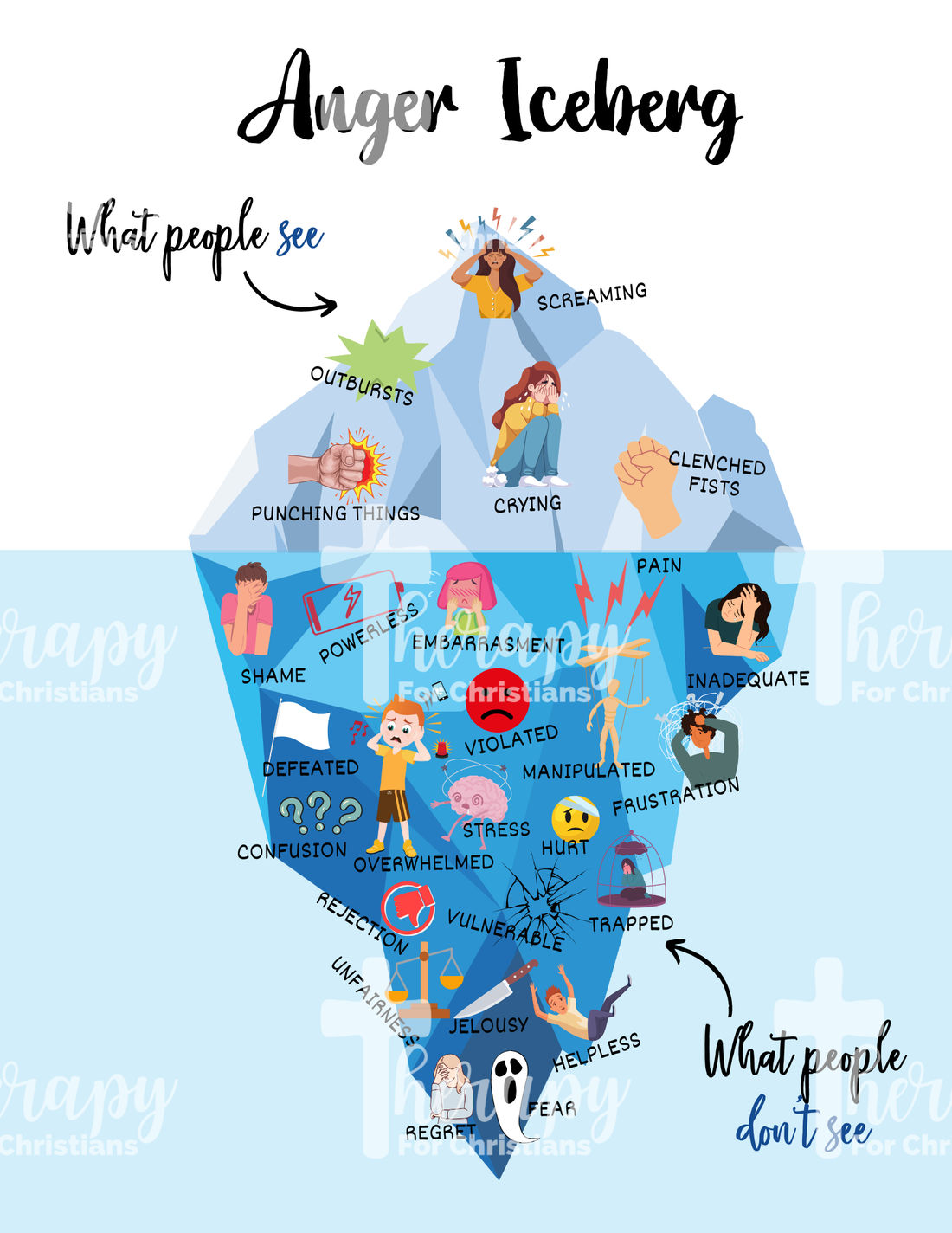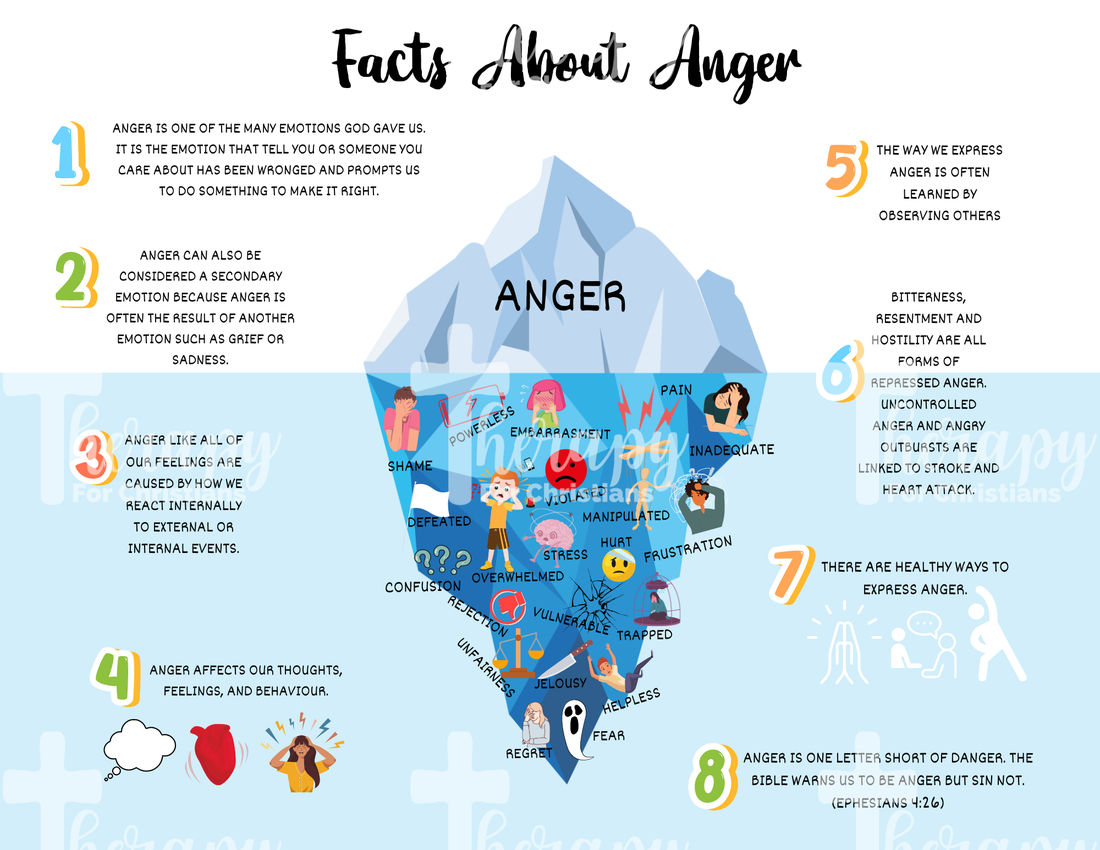
Anger is a normal emotion, but it can be difficult to manage. When we're angry, it's easy to let our emotions get the best of us and say or do things we regret. The Bible teaches us that it is okay to be angry as long as we don't sin, and that we should strive to control our anger and forgive those who have wronged us.
The anger iceberg is a metaphor that can help us understand anger better from a Christian perspective. It helps us see that anger is often just the tip of the iceberg, and there are other emotions that may be hidden beneath the surface. These hidden emotions may be rooted in our sin nature, such as pride, selfishness, or bitterness.
The anger iceberg can be a helpful tool for understanding our anger and learning how to manage it in a healthy way from a Christian perspective. By identifying the underlying emotions that are driving our anger, we can start to address them in a more constructive way, such as through prayer, forgiveness, and self-control.

What is the Anger Iceberg?
The concept of the anger iceberg was introduced by the Gottman Institute, a research and education organization focusing on relationships. Their research shows that anger is often a secondary emotion, triggered by primary feelings such as sadness, fear, or hurt.
The Gottman institute developed the anger iceberg is a metaphor to help us understand that anger is often just the tip of the iceberg.
This iceberg is divided into three levels:
The visible level: This is the anger we outwardly express, characterized by raised voices, yelling, or physical aggression.
The submerged level: These emotions are hidden beneath the surface but still noticeable, leading to tension, frustration, and irritability.
The hidden level: The deepest and most concealed layer includes emotions like sadness, fear, hurt, and guilt.
The anger iceberg is a useful tool for understanding anger and learning healthier management techniques. Identifying these underlying emotions empowers us to address them more constructively.
 Pin It
Pin It
How to Use the Anger Iceberg
The anger iceberg can be used to improve our anger management in a few steps:
Recognize the anger. The first step is to acknowledge and accept that you are feeling angry. This is the visible part of the iceberg.
Pause and reflect. When you notice your anger, take a moment to pause and reflect on what might be causing it. Try to identify the specific situation, event, or person that triggered your anger.
Explore the deeper emotions. The next step is to dig deeper into your emotions. Ask yourself questions like:
What other emotions am I feeling besides anger? (e.g., frustration, sadness, fear, disappointment)
What thoughts or beliefs might be contributing to my anger? (e.g., feeling misunderstood, unappreciated, or threatened)
Are there any past experiences or unresolved issues that are fueling my anger in this situation?
Develop coping strategies. Once you've identified the underlying emotions and triggers, work on developing healthy coping strategies to manage your anger. These may include:
Deep breathing exercises to calm yourself in the moment.
Time-outs to give yourself space to cool off before reacting.
Communication skills to express your feelings assertively and constructively.
Problem-solving skills to address the root causes of your anger.
Stress management techniques like meditation or exercise.
Practice self-compassion. Be kind to yourself during this process. It's okay to feel anger and other emotions, and it's a part of being human. Recognize that you're taking steps to improve your emotional well-being and communication skills.
Monitor your progress. Keep track of how you manage your anger over time. If you notice improvements, celebrate your successes. If you still struggle with anger, continue working on understanding and addressing the underlying issues.

When to Use the Anger Iceberg
The anger iceberg can be used in a variety of situations, but it is most helpful when you are feeling angry and want to understand why. Here are some examples of when you might use the anger iceberg:
When you are feeling angry and don't know why.
When you are in a conflict with someone and want to understand their anger.
When you are trying to manage your own anger.
When you are working with a therapist or counselor to address anger issues.
When you are teaching someone about anger management.
Eight Facts about Anger

Anger is one of the many emotions God gave us. It is the emotion that tell you or someone you care about has been wronged and prompts us to do something to make it right, which is why getting angry can be good.
Anger can also be considered a secondary emotion because anger is often the result of another emotion such as grief or sadness.
Anger like all of our feelings are caused by how we react internally to external or internal events.
Anger affects our thoughts, feelings, and behavior and one of the most common therapy to treat anger issues is cognitive behavioral therapy.
The way we express anger is often learned by observing others.
Bitterness, resentment and hostility are all forms of repressed anger. Uncontrolled anger and angry outbursts are linked to stroke and heart attack.
There are healthy ways to express anger. In fact the Bible gives us a plan to manage anger.
Anger is one letter short of Danger. The Bible warns us to be anger but sin not (Bible verse)
Related: Where do You Feel Emotions in Your Body
Final Thoughts on The Anger iceberg
Managing anger is a journey, and it takes time and effort. But with patience and perseverance, we can learn to control our anger and live more peaceful lives. Remember, if you're struggling to manage your anger effectively, it's crucial to seek professional help from a therapist or counselor who can assist you in comprehending your anger and developing healthy coping strategies.
If you want the above anger iceberg worksheet, you can purchase them from our Gumroad store.
Before you leave, we would appreciate it if you helped us spread the word by sharing, tweeting, pinning, etc. this post.
About the Author:  Corine Williams, Ph.D. is Clinical Psychologist that is currently seeing clients in the States of Maryland, New Jersey, and New York. You can find out more about her practice by visiting www.therapyforchristians.com/corinewilliams. In addition to providing individual therapy, Dr. Williams is also passionate about writing books and designing merchandise that educate, uplift, and normalize mental health subject in the Christian community. You can find out more about her at www.booksbycorine.com or by visiting her amazon profile here: https://www.amazon.com/Corine-Hyman/e/B00AWZ5FL2
Corine Williams, Ph.D. is Clinical Psychologist that is currently seeing clients in the States of Maryland, New Jersey, and New York. You can find out more about her practice by visiting www.therapyforchristians.com/corinewilliams. In addition to providing individual therapy, Dr. Williams is also passionate about writing books and designing merchandise that educate, uplift, and normalize mental health subject in the Christian community. You can find out more about her at www.booksbycorine.com or by visiting her amazon profile here: https://www.amazon.com/Corine-Hyman/e/B00AWZ5FL2
Help us increase mental health awareness in the Christian community by donating through our paypal link here: www.paypal.com/therapyforchristians, joining our mailing list by clicking below, or join our provider list here: Provider listing
Disclaimer: the information, including but not limited to, text, graphics, images and other material contained on this article are for informational purposes only. No material on this site is intended to be a substitute for professional medical advice, diagnosis or treatment. If you are looking for a Christian counselor near you, please check out our directory located here: Christians Therapist Near Me
Featured Christian Therapists
Specialty Psychiatrist or Nurse Practiti... Located in E BRIDGEWTR, MA
View Listing.png)
)-(1).jpg)














